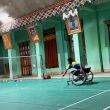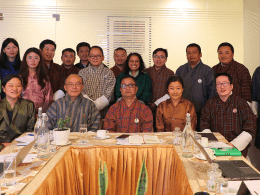In a growing effort to address crime and digital threats nationwide, the police force has begun reaching out to monastic institutions, raising awareness among monks and nuns about emerging social dangers. The initiative aims to equip religious communities—often seen as isolated from modern societal issues—with the knowledge to protect themselves and others.
Last week, officers visited Simtokha Shedra in Thimphu to conduct a sensitisation session, speaking directly to monks about the dangers of substance abuse, crime, and the increasingly prevalent issues of pornography and cyberbullying.
Officials say these visits are part of a broader crime prevention strategy that includes digital literacy and protection. “Even monastic institutions are not immune to the challenges of the modern world,” one police officer said. “We want to ensure that young monks and nuns understand the risks and are empowered to use technology responsibly.”
The sessions addressed the troubling rise in online exploitation cases, where victims—often minors—are blackmailed with compromising videos or images. These materials, frequently recorded without consent, are then shared on social media platforms or used to extort money.
More alarmingly, police say that adolescents are often unknowingly added to online groups that circulate explicit content. Lacking the digital literacy to navigate or report such threats, these young individuals remain especially vulnerable.
In response, the Central Monastic Body has taken significant steps to incorporate life skills into monastic education. Earlier this year, in collaboration with the United Nations Population Fund (UNFPA), they introduced a new curriculum for primary-level monks and nuns, covering a wide range of social and personal development topics.
The curriculum includes lessons on sexual and reproductive health, hygiene, teenage pregnancy, and sexual harassment—subjects traditionally considered outside the bounds of monastic education. Importantly, it also addresses digital risks, including pornography and cyberbullying.
“Our monks and nuns are like any other children in schools,” said Dorji Khandu, Deputy Secretary of the Council for Buddhist University. “They face similar challenges, and we must prepare them. By teaching them about these issues and showing them where to seek help, we are protecting them for the future.”
Dorji Khandu added that monastic teachers across the country will undergo training on the new curriculum starting next month. The lessons are expected to be formally introduced in monastic classrooms by October.
With police and religious institutions working hand in hand, Bhutan is taking a proactive approach to ensuring that even its most sacred spaces are equipped to confront the realities of a changing world.








